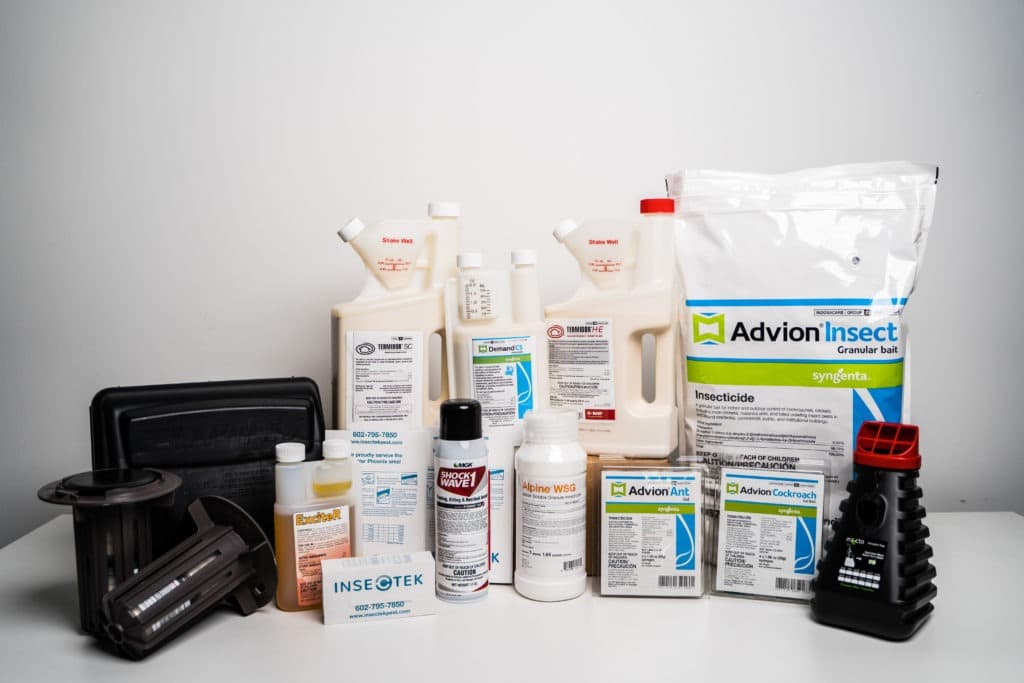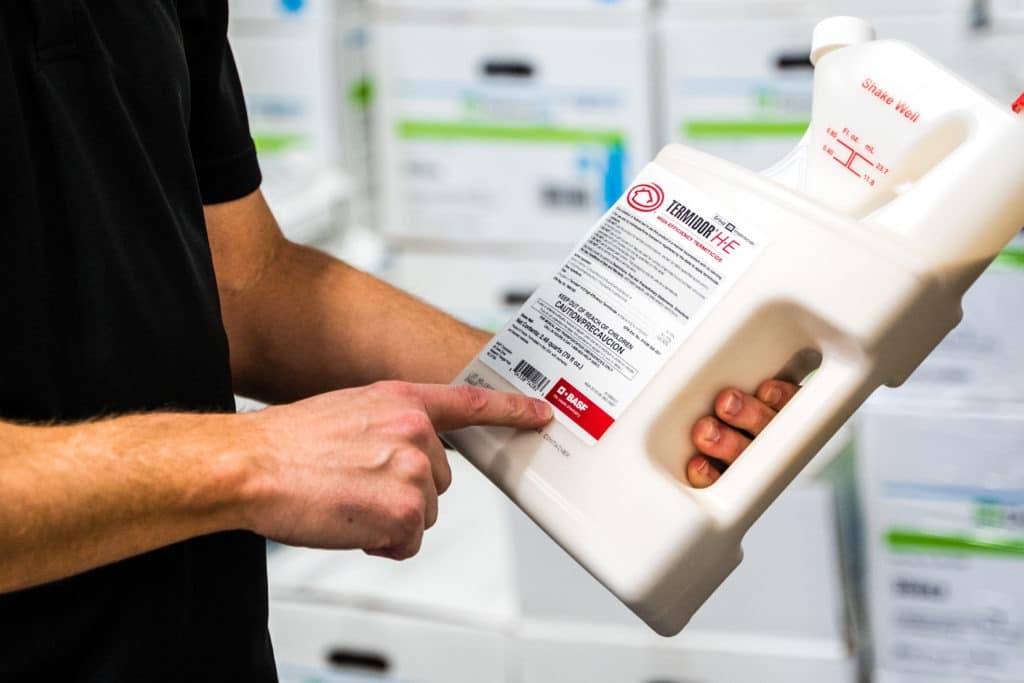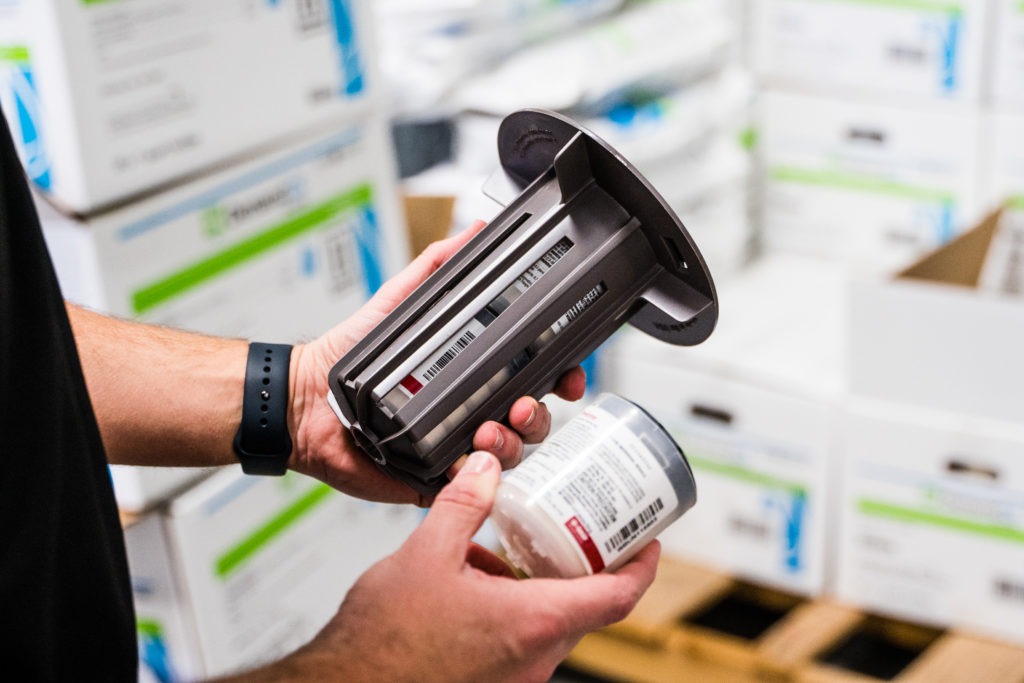
Organic Pest Control in Arizona
Let’s face it – we want pesticides strong enough to kill pests and rodents but safe enough for our plants, animals, and especially our health. Is it possible to be that picky about your pest control? Well, thanks to modern technological advancements in integrated pest management, we’re able to offer you solutions you can count on for both effectiveness and safety.
And here’s some fantastic news: Our EPA-approved synthetic pesticides and organic alternatives are not only effective for ridding even the worst of infestations, but you can rest easy knowing that your family and your pets remain safe – unlike any pests invading your home.
This means that even inorganic pesticides work great for those with health concerns and hesitations when hiring local integrated pest management services.
However, you might be concerned about the long-term effects of EPA-approved chemical pesticides due to bioaccumulation from as small as local lawn care (i.e. weed killers) all the way to the agricultural industry.
We’re here to offer you options, while at the same time bearing truth to the real difference between organic and synthetic pesticides – which isn’t what you’re likely to expect.

What Is Organic Pest Control?
Organic pest control uses chemical-free solutions made from organic material, especially botanical, derived from plants and the earth that naturally repel pests.
Organic or natural sources such as peppermint and rosemary have natural repellent properties that target octopamine which only exists in bugs, making organic solutions harmless to you, your children, and your pets.
- Peppermint
- Lemon Grass
- Mint
- Basil
- Sage
- Tea Tree
- Rosemary
- Cinnamon
- Clove
- Lavender
- Eucalyptus
- Citronella
Does Organic Pest Control Work?
Organic pest control service does indeed work both preventatively and as a reactive measure for fending off an infestation. Still, organic solutions aren’t nearly as robust as synthetic solutions, requiring more effort and frequency to ensure effectiveness.
Unfortunately, their lack of potency also means you’ll have to schedule service with your local pest control provider frequently. Some integrated pest management companies will charge you for those extra visits required for organic solutions, thus costing you more than you might have anticipated.

Is Organic Pest Control Safe for Gardens?
Although organic pesticides have come a long way in environmental safety and low residual harm, they aren’t entirely safe enough to use on edible gardens at this time. While they are less toxic than synthetic pesticides, they are still designed to kill insects and shouldn’t be ingested.
Is It Safe Inside?
Organic pest solutions have an organic base with repellent properties that, when applied appropriately, will only affect insects without any risk for humans, animals, and plants. Unfortunately, organic solutions aren’t as effective and won’t last nearly as long as their synthetic counterparts. However, science has come a long way in the pest control industry, making chemical-based pesticides just as safe.
What Are Some Common Organic Pest Control Methods?
Despite the lack of a garden-friendly pesticide, there are alternative pest control methods that’ll keep your garden edible and healthy, some of which you can purchase at the likes of your local Home Depot.
Beneficial Nematodes
Beneficial nematodes are tiny little roundworms that are commonly found in soil around the world. The secret weapon is inside the nematode’s gut: bacteria that kills insects within 48 hours. These nematodes enter a pest and release their bacteria inside the pest’s body, causing blood poisoning, ultimately leading to death.
As frightening as beneficial nematodes might sound, they unquestionably pose no risk to your family or animals.
Neem Oil
Neem oil is another standard organic pesticide solution used by plenty of gardeners that you could either purchase commercially or make yourself. Neem oil comes from pressing neem tree seeds, creating a potent oil containing azadirachtin that disrupts insects’ lifecycle without harming humans, animals, and good insects like bees, butterflies, and earthworms.
All you need to do is spray your plants in the morning or evening (when the sun is low and beneficial insects are dormant), and you can do this no matter what season it is.
Spinosad
Especially effective for caterpillars and thrips, Spinosad is a garden-friendly insecticide derived from a bacterium called Saccharopolyspora spinosa. Having its beginnings as a fire ant bait, Spinosad does well to terminate pesky garden invaders such as a variety of caterpillars, beetles, and thrips.
Pyrethrins
Pyrethrins are naturally occurring insecticidal chemicals found in the Pyrethrum daisy (Chrysanthemum cinerariifolium), which are toxic to insects while non-toxic to humans. Its high toxicity also kills beneficial insects, so beware when using it alongside other garden treatments such as beneficial nematodes or on pollinated vegetables and plants.
Diatomaceous Earth
Food-grade diatomaceous earth is a powder made of microscopic cylinders covered in spikes that penetrate garden pests while pulling out their body fluid. Although death isn’t immediate, you can see results as soon as within 24 hours, depending on the pest.
OMRI-Certified Products
Products certified by the Organic Materials Review Institute (OMRI) include organic pesticide solutions the institute vets for compliance with organic standards for environmental safety.
Always contact the manufacturer if you have questions about the safety or effectiveness of a product you intend to use around your property.

Pros and Cons of Organic Pest Control
You might be looking to go green for your pest control, but the best that nature currently has to offer still has its major drawbacks when compared to today’s newest synthetic pesticides.
What are the pros and cons of our current organic pesticide products?
Pros
- Great for preventative pest treatment
- Safe around humans and animals
- So safe, they’re exempt from EPA registration as pesticides
- Sourced by nature: botanical and essential oil-based solutions
Cons
- It doesn’t last nearly as long or is as effective as synthetic solutions
- More frequent pest tech visits for routine sprays = increased cost (depending on the provider)
- Unideal for more severe infestations, such as scorpions.
- Still unsafe for vegetable gardens
Organic Pest Control vs. Synthetic
The reality of organic pesticides is that they are nowhere near as effective or last as long as synthetic solutions. The good news is that our synthetic pesticides are EPA-approved and are entirely safe for your family, pets, and the overall environment when applied by our trained technicians.
All “synthetic” means is that the same natural compounds used in our organic pesticides (such as peppermint oil) are enhanced in a lab and therefore become a higher-potency version that works quicker, is stronger, and lasts much longer.
The efficiency of our EPA-approved synthetic pesticides matters most when you’re facing a severe scorpion infestation, for instance. To ensure the safety of you and your family, as well as the sure eradication of the threat, we will always first and foremost recommend a synthetic solution that will no doubt thwart even the most serious infestations.
Eco-Friendly Natural Pest Control in Arizona
If you’re looking for integrated pest management, you’ve come to the best place in Arizona.
We at Insectek offer EPA-approved synthetic and organic pesticides as well as alternative pest control methods to suit your pest control needs while keeping your family and pets safe.
Our products include:
Essentria IC-3
Featuring botanically derived essential oils from rosemary, geraniol, and peppermint, IC-3 is the perfect organic solution that is deadly against the most egregious insects – like mosquitoes – yet safe around children and pets.
The active ingredients in IC-3 give you a robust defense against a variety of pests, including mosquitoes, ticks, fleas, flies, and has “larvicidal effects” on many insects.


Trelona ATBS Annual Bait Stations + Termite Bait System
A perfect way for eliminating termite colonies from within, bait stations create a termite-friendly environment giving off Novaluron (a pesticide), which termites will then carry back into their colony, eventually releasing and therefore beginning the elimination process.
Are you facing a pest infestation, or are you looking to prevent one in the future? Contact us today, and we’ll develop the best pest control strategy fitting for your home, your family, and your budget.
Frequently Asked Questions
How do I know what kind of pest control service I need?
At Insectek, we employ the highest moral and ethical standards for treatments, and therefore we do not recommend anything our customers do not need. Instead, we focus on understanding the pest activity and pest tolerance of a client before making a recommendation.
As your locally owned, operated, and vested pest control exterminators, we believe earning your business based on what you need and not what we want to try and sell you instead will keep your loyalty, trust, and business for years to come. Try out our recommendation app below to find out what kind of service is best for you.
Why do I still see bugs here and there when I have an exterminator service?
The pest control products that are available to professionals, like the Arizona pest control exterminators at Insectek, have to balance the important task of eliminating as many pests as possible—while at the same time making sure they are safe for you, your family, and of course your pets. Therefore, the extermination team at Insectek Pest Solutions utilizes the best and safest products available but, in most cases, cannot treat every single pest with one pass of the wand.
Are the products your exterminator uses safe for my family and pets?
The products on the market our extermination technicians use in your home undergo rigorous research, development, and testing first at the manufacturer level, then at the Environmental Protection Agency (EPA), and finally, in many cases, through the State Department of Agriculture. Even with this multiple-layer system, it’s important to have an educated understanding of and conservative respect for the pest control products that are applied in and around your home.
In most cases, a person or pet should stay out of the treated area until the pest control solution is dry. Our Arizona pest control and extermination team will provide you with a detailed service report that states the name of each product used, as well as where it was applied. If you ever have any questions about a specific product we used, please reach out to us so that labels and material data safety sheets can be provided.
What is considered a “green” pest control treatment?
A green or organic pest control treatment is any treatment that uses a naturally occurring, non-synthetically altered, or enhanced pesticide. These products are usually botanical, and they have proven to be quite effective overall. However, they do sometimes lack the residual power of synthetic versions that have been created by scientists in laboratories.
What are the most dangerous pests in Arizona?
There are many dangerous pests in Arizona that not only cause painful bites and stings but also that can pass on dangerous diseases. These pests include scorpions, black widows, brown recluse spiders, ticks, fleas, assassin bugs, and rodents. The Arizona pest control extermination team at Insectek is very knowledgeable and experienced in where these pests and many others indigenous to Arizona are concerned.

Receive an Instant Evaluation Today!
Don’t let pests control your life. Request a quote for an instant evaluation and let Insectek be your go-to for pest maintenance.


